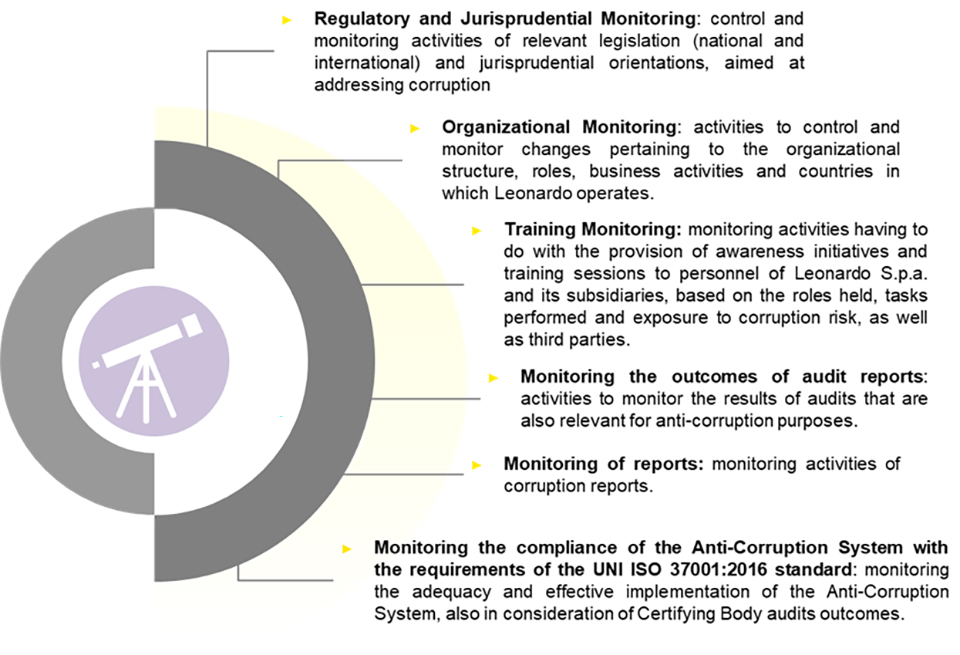The Coordination and Consultation Body for the Prevention of Corruption, consisting of the Chairman of Leonardo's Board of Directors and the Chairmen of the Control and Risk Committee, the Board of Statutory Auditors and the Surveillance Body of Leonardo pursuant to Legislative Decree 231/01, coordinates the offices responsible for verifying compliance with the applicable rules of conduct at Group level, and oversees the application of the Anti-Corruption Code, as well as its update.
In Leonardo Spa there is a specific Unit responsible for overseeing the Anti-Bribery Management System, monitoring its functioning, adequacy with respect to the risks and effective implementation as well as for promoting update in case of changes of the applicable law and/or the relevant internal or external factors. The Anti-Corruption Unit reports hierarchically to the Chief Compliance Officer and functionally to the Chairman, in accordance with the powers of attorney issued by the Board of Directors.
Training
Training is a core element for the mitigation of the Company exposure to corruption risks.
For this reason, Leonardo S.p.a. invests in:
- Mandatory training programmes: sessions for all employees, focusing on anti-corruption, applicable legislation, and internal procedures.
- Thematic workshops: specific meetings to focus on risk situations and best practices.
- Awareness-raising campaigns: activities to raise awareness and train third parties to promote a corporate culture based on integrity and transparency.
Training activities are differentiated by functions and risks to which personnel is exposed and repeated periodically, according to the risks associated with the role performed and the function covered. The effectiveness of anti-corruption communications and training activities is monitored, with the support of the relevant Organizational Units, through periodic verification of the trained personnel.
International Conferences and Working Groups
Leonardo S.p.a. also promotes and spreads a culture of integrity at an international level. The Company actively participates in conventions, working groups and global initiatives that address the issues of compliance, anti-corruption, and ethical responsibility, contributing to the sharing of best practices in the sector.
Leonardo S.p.a. is also an active member of the International Forum on Business Ethical Conduct (IFBEC), an organisation that involves leaders in the AD&S sector to promote the highest standards of ethics and integrity in responsible business conduct.
In recent years, the Compliance Unit has been attending:
- IFBEC International Conferences: speaking on topics such as preventing corruption and promoting effective compliance systems.
- Roundtables: sharing best practices and innovative solutions with experts and representatives of other global companies.
- Compliance Workshops: thematic workshops and meetings with experts to discuss international regulations, emerging risks, and process monitoring.
Leonardo also collaborates with TRACE International, an international association committed to spreading ethical values and principles and anti-corruption.
Actively participating in international conferences and working groups allows the company to: share its experience and discuss with other companies in the sector, contribute to the evolution of worldwide compliance standards and strengthen the company's ethical culture.
Monitoring
Continuous monitoring is a fundamental pillar. Through a structured approach, Leonardo is committed to ensuring compliance with regulations and continuous improvement of business processes.
Leonardo monitors and evaluates on an ongoing basis and with the support of the relevant Organizational Units, for their respective areas of competence, the functioning, adequacy and effective implementation of the Anti-Bribery Management System.
In order to ensure compliance with the regulations of all the countries in which Leonardo is based, a wide network of law firms located all over the world has been developed, which assist the Company, through specific legal opinions, in the knowledge and monitoring of relevant rules and regulations.
The main areas of monitoring include:

Monitoring activities are a key element in the continuous improvement of the Anti-Bribery Management System.


